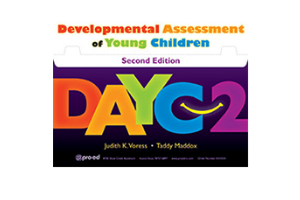Description
The Developmental Assessment of Young Children Second Edition (DAYC-2) is a popular test used to identify children with possible delays in five different domains.

The Developmental Assessment of Young Children Second Edition (DAYC-2) is a popular test used to identify children with possible delays in five different domains.
The Developmental Assessment of Young Children Second Edition (DAYC-2) is a popular test used to identify children with possible delays in five different domains.
Judith K. Voress, Taddy Maddox
Age Range:Birth through 5
Completion Time:10–20 minutes for each domain
Scores/Interpretation:Standard scores, percentile ranks, and age equivalents
Publication Date:2012
The DAYC-2 is a popular test used to identify children birth through 5:11 with possible delays in the following domains:
Each of the five domains reflects an area mandated for assessment and intervention for young children in IDEA. The domains can be assessed independently, so examiners may test only the domains that interest them or test all five domains when a measure of general development is desired. The DAYC-2 format allows examiners to obtain information about a child’s abilities through observation, interview of caregivers, and direct assessment. The DAYC-2 may be used in arena assessment so that each discipline can use the evaluation tool independently.
The DAYC-2 was normed on a national sample of 1,832 children; characteristics of the normative sample approximate the 2010 census. Standard scores, percentile ranks, and age equivalents are provided for each domain, and for overall general development if all five domains are tested.